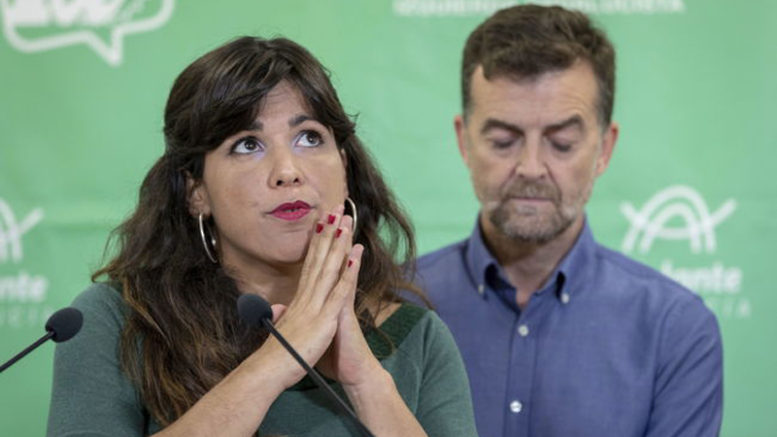While the poor showing of the governing Socialist party (PSOE) was a focus of Spanish and international news coverage of Sunday’s regional elections in Andalucía, the PSOE’s once-rising leftwing challenger Podemos turned in equally dismal results – generating immediate and highly visible fractures along fault lines that continue to divide the party’s three competing factions.
Dominated by the Anticapitalista wing of the party under the leadership of Teresa Rodríguez, Podemos Andalucía bucked the wishes of national party leadership to run a regional coalition ticket in Sunday’s elections under the banner of Adelante Andalucía (‘Andalucia Forward’). The result was a loss of 282,519 votes over the total received in 2015 regional elections, with the AA coalition winning just 16.21 percent of Sunday’s vote total for 17 seats in the regional assembly — three fewer than the 20 seats Podemos controlled in the Andalucía parliament over the past three years.
 The disappointment of Andalucía immediately opened up the division within Podemos’ three blocs: the national leadership that has coalesced around party co-founder and current secretary general Pablo Iglesias; the Anticapitalista faction, which is the continuation within Podemos of the former Trotskyist Liga Comunista Revolucionaria (LCR, or Revolutionary Communist League); and the more moderate ‘transversal’ wing of the party, grouped around Podemos co-founder Íñigo Errejón.
The disappointment of Andalucía immediately opened up the division within Podemos’ three blocs: the national leadership that has coalesced around party co-founder and current secretary general Pablo Iglesias; the Anticapitalista faction, which is the continuation within Podemos of the former Trotskyist Liga Comunista Revolucionaria (LCR, or Revolutionary Communist League); and the more moderate ‘transversal’ wing of the party, grouped around Podemos co-founder Íñigo Errejón.
Immediately upon learning of Sunday’s results, Iglesias ally and party co-founder Juan Carlos Monedero called for Rodríguez to resign, while Iglesias pointed to the surprisingly strong showing by the far-right VOX party as the reason for the Podemos slippage, suggesting Rodríguez support formation of a coalition government including the Socialists and centre-right Ciudadanos party in order to keep VOX from enabling a right-wing regional government.
Errejón weighed in with a more moderate view, cautioning against interpreting the results as showing a shift of working class voters away from the Left because of the anti-immigrant and ultra-nationalist rhetoric of VOX during the campaign and suggesting Podemos needs to do more to listen to voters and respond to their concerns and needs.
Rodríguez is having none of it, however, refusing to resign or assume direct responsibility for the disappointing showing at the polls, claiming that the regional party needs six weeks for a post-mortem analysis of what went wrong in the election before drawing definitive conclusions.
That timetable clashes with Iglesias’ scheduling of internal Podemos primary elections from 15th-20th of December over fears that President Pedro Sánchez of the Socialist party could call a snap general election as early as March of 2019. The move for early primaries has its critics, including those in the party who see it as precipitous and a maneuver by Iglesias to cement his leadership — not unexpectedly, just after the Andalucía vote Rodríguez called for suspension of the primaries, saying they would only serve to deepen divisions within the party and further its demise.
 All in all, the showing in Andalucía has served to deepen the existing rifts within Podemos and leaves the party a far cry from the days when its leadership was predicting a sorpasso (Italian for ‘overtaking’) of the PSOE as the largest party on the Spanish Left — a longtime aspiration of Spain’s now all-but-defunct Communist Party and its successor coalition, Izquierda Unida (IU, United Left), today merely the junior electoral alliance partner of Podemos.
All in all, the showing in Andalucía has served to deepen the existing rifts within Podemos and leaves the party a far cry from the days when its leadership was predicting a sorpasso (Italian for ‘overtaking’) of the PSOE as the largest party on the Spanish Left — a longtime aspiration of Spain’s now all-but-defunct Communist Party and its successor coalition, Izquierda Unida (IU, United Left), today merely the junior electoral alliance partner of Podemos.
Sunday’s poor showing in Andalucía appeared to make the sorpasso possibility so remote that one commentator sarcastically congratulated Pablo Iglesias for having managed to do no more since the party’s founding in 2014 than simply replace Izquierda Unida with Podemos as the perennial second-ranked party of the Spanish Left.
► Read More in Spanish at El País, Cadena SER and Europa Press …
► Click to read more news about Politics in Spain …
Check out more news from Spain about:
► Animal Welfare ► Corruption/Transparency ► Discrimination ► Education ► Children’s Rights ► Environment & Sustainability ► Fair Trade & Development Aid ► Healthcare ► Historical Memory ► Housing & Homelessness ► Human Rights ► Labour & Unemployment ► LGBT ► Peace & War ► Politics ► Poverty ► Refugees & Migration ► Technology & Social Enterprise ► Women’s Rights

